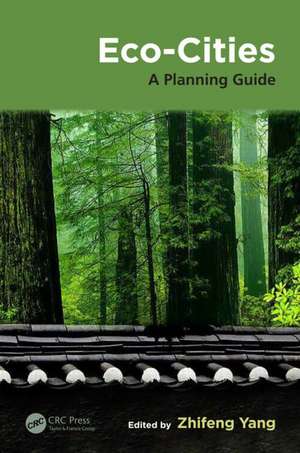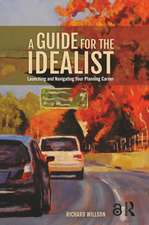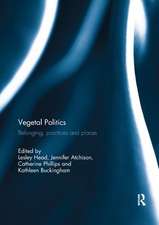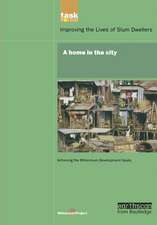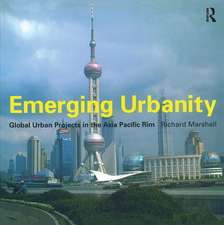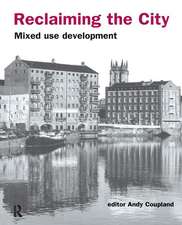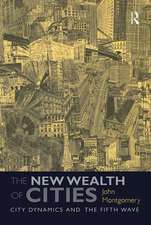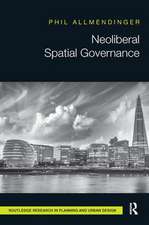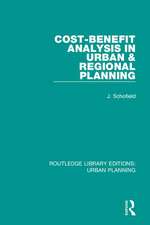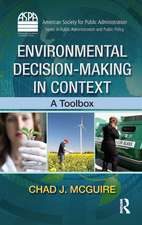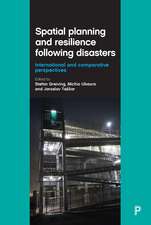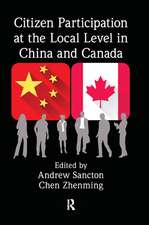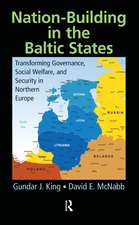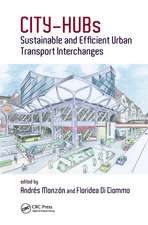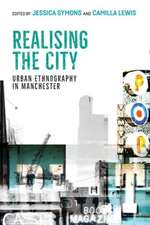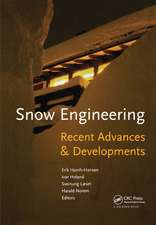Eco-Cities: A Planning Guide: Applied Ecology and Environmental Management
Editat de Zhifeng Yangen Limba Engleză Hardback – 15 oct 2012
Emphasizing integration, the first part of the book discusses various aspects of planning theory. It presents three innovative theories for socioeconomic models: a theory on the locational choices made by households and firms, an urban version of the stream continuum concept, and an application of metacommunity theory to the fragmented urban biota. These theories raise new urban planning questions and stimulate integrated modeling. The book also introduces urban planning modeling that uses existing social, vegetation, ecohydrological, and ecosystem service modules but is refined and operated for enhanced cross-disciplinary integration and prediction. The second part of the book consists of several case studies of Chinese eco-cities covering a majority of the urban development patterns that offer in-depth examples of planning practices currently in use.
Drawing on experimentation, comparison, long-term measurement, and modeling, this fascinating guide helps readers better understand eco-cities and eco-landscapes as integrated, spatially extensive, complex adaptive systems. It lays a solid foundation for engagement between urban planners, researchers, educators, policy makers, and citizens as they work to adapt to changing environmental, social, and economic conditions.
| Toate formatele și edițiile | Preț | Express |
|---|---|---|
| Paperback (1) | 585.27 lei 6-8 săpt. | |
| CRC Press – 29 mar 2017 | 585.27 lei 6-8 săpt. | |
| Hardback (1) | 1401.18 lei 6-8 săpt. | |
| CRC Press – 15 oct 2012 | 1401.18 lei 6-8 săpt. |
Din seria Applied Ecology and Environmental Management
- 18%
 Preț: 1299.23 lei
Preț: 1299.23 lei - 15%
 Preț: 585.27 lei
Preț: 585.27 lei - 15%
 Preț: 461.03 lei
Preț: 461.03 lei - 22%
 Preț: 329.91 lei
Preț: 329.91 lei -
 Preț: 445.99 lei
Preț: 445.99 lei - 15%
 Preț: 427.16 lei
Preț: 427.16 lei - 12%
 Preț: 343.91 lei
Preț: 343.91 lei - 13%
 Preț: 297.05 lei
Preț: 297.05 lei - 25%
 Preț: 3753.12 lei
Preț: 3753.12 lei - 27%
 Preț: 380.05 lei
Preț: 380.05 lei - 13%
 Preț: 315.29 lei
Preț: 315.29 lei - 15%
 Preț: 585.27 lei
Preț: 585.27 lei -
 Preț: 471.47 lei
Preț: 471.47 lei -
 Preț: 436.14 lei
Preț: 436.14 lei - 18%
 Preț: 1120.23 lei
Preț: 1120.23 lei - 15%
 Preț: 697.38 lei
Preț: 697.38 lei
Preț: 1401.18 lei
Preț vechi: 1708.76 lei
-18% Nou
Puncte Express: 2102
Preț estimativ în valută:
268.11€ • 279.93$ • 221.90£
268.11€ • 279.93$ • 221.90£
Carte tipărită la comandă
Livrare economică 05-19 aprilie
Preluare comenzi: 021 569.72.76
Specificații
ISBN-13: 9781439883228
ISBN-10: 143988322X
Pagini: 620
Ilustrații: 134 black & white illustrations, 179 black & white tables
Dimensiuni: 152 x 229 x 36 mm
Greutate: 1.02 kg
Ediția:New.
Editura: CRC Press
Colecția CRC Press
Seria Applied Ecology and Environmental Management
Locul publicării:Boca Raton, United States
ISBN-10: 143988322X
Pagini: 620
Ilustrații: 134 black & white illustrations, 179 black & white tables
Dimensiuni: 152 x 229 x 36 mm
Greutate: 1.02 kg
Ediția:New.
Editura: CRC Press
Colecția CRC Press
Seria Applied Ecology and Environmental Management
Locul publicării:Boca Raton, United States
Public țintă
Researchers and policy makers in urban planning, geography, ecology, and development studies; and graduate students in urban planning and environmental management.Cuprins
Theoretical Bases: Eco-city Planning Theories and Thoughts. Integrated Urban Ecosystem Assessments. Planning of Ecological Spatial System. Planning of Industry System. Planning of Sustainable Energy and Air Pollution Prevention. Urban Water Environment Quality Improvement Plan. Eco-Habitat and Eco-Cultural System Planning. Urban Ecological Planning Regulation. Case Studies: Eco-City Guangzhou Plan. Eco-City Xiamen Plan. Eco-City Baotou Plan. Eco-City Wuyishan Plan. Eco-City Wanzhou Plan. Eco-City Jingdezhen Plan. Assessment of Sustainability for a City by Application of a Work Energy Balance and a Carbon Cycling Model. Index.
Notă biografică
Zhifeng Yang is a professor and the dean of the School of Environment at Beijing Normal University. His research areas include urban ecological planning and management. He has authored more than 10 books on urban planning, water resources management, and ecological engineering, and has published more than 300 peer-reviewed articles. Professor Yang is an associate editor of the Journal of Environmental Informatics and the Journal of Environmental Sciences, and a guest editor of Ecological Modelling and Ecological Informatics. He is also an editorial member of the Journal of Hydrodynamics, Communications in Nonlinear Science and Numerical Simulation, and Frontiers of Environmental Science & Engineering in China.
Recenzii
"Eco-Cities: A Planning Guide is an essential guidebook to a powerful new way of understanding the relationships between humans and nature in the context of our modern urban ecosystems. Providing a comprehensive theoretical basis, several case studies, and the explanation of very innovative methodologies for integrated urban ecosystem assessment, this book will become a key reference for students, scientists, professionals, and policy makers interested in planning and managing sustainable cities."
—Pier Paolo Franzese, Parthenope University of Naples, Italy
"What fascinates me most is the detailed Chinese eco-city cases and specific eco-city planning processes. Anyone interested in the ‘how and why’ of Chinese eco-city planning history and processes would do well to use this book as a starting point."
—Guoqian Chen, College of Engineering, Peking University, China
"Overall, the book is a needed contribution in combining concepts of ecology and urbanism and in moving sustainable development from theory to practice."
—Brian D. Fath, Towson University, Maryland, USA
—Pier Paolo Franzese, Parthenope University of Naples, Italy
"What fascinates me most is the detailed Chinese eco-city cases and specific eco-city planning processes. Anyone interested in the ‘how and why’ of Chinese eco-city planning history and processes would do well to use this book as a starting point."
—Guoqian Chen, College of Engineering, Peking University, China
"Overall, the book is a needed contribution in combining concepts of ecology and urbanism and in moving sustainable development from theory to practice."
—Brian D. Fath, Towson University, Maryland, USA
Descriere
This guide provides an overview of urban ecosystem structures, functions, and changes and discusses how to successfully accomplish eco-city planning based on government requirements. It adds a new dimension to the understanding and the application of the concept of urban sustainability, based on hypotheses about social and biogeophysical processes and through in-depth case studies. It presents three novel theories for socioeconomic metabolic models and discusses total urban ecosystem health using both the traditional environmental analysis method and emergy and exergy as holistic indicators.
